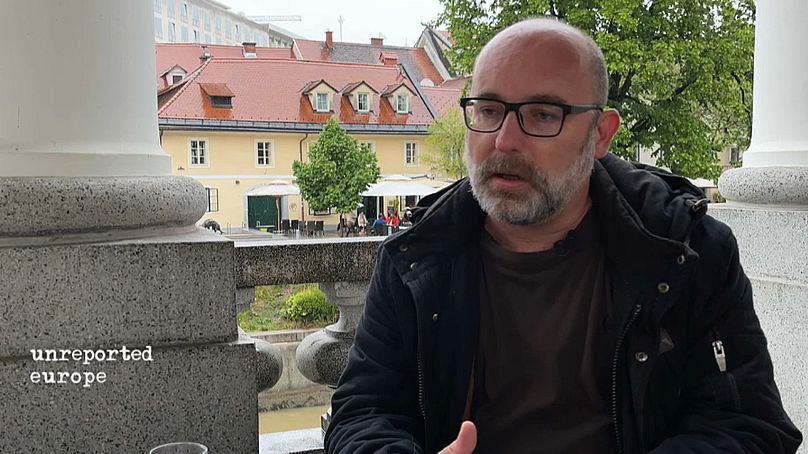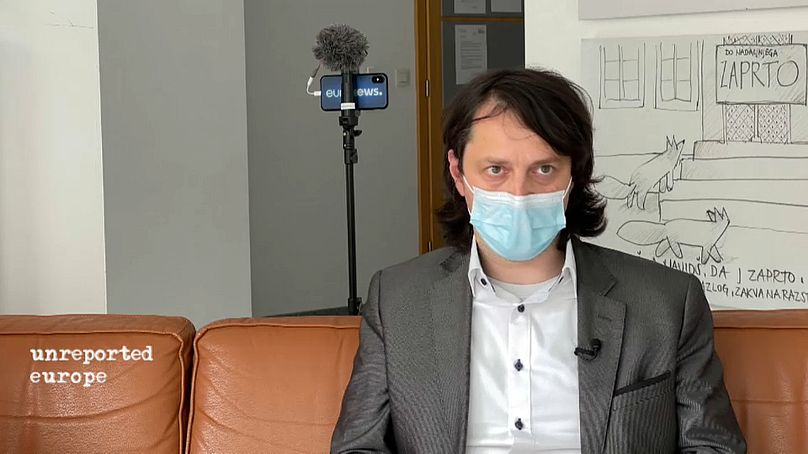Are journalists being censored and intimidated in Slovenia? The Prime Minister of the next country to hold the Presidency of the European Council has come under fire for waging a war on the media. Journalists, the authorities, and citizens tell their stories about press freedom in the country.
Every Friday in Ljubjana, the capital of Slovenia, hundreds of demonstrators, many on bicycles, gather in front of the parliament to express their anger towards the government of Prime Minister Janez Jansa.
On the day that we film there, the protest is in solidarity with Palestinians and against the government's support for Israel in the latest conflict. However, like every week for the past year, freedom of the press is high on the protest’s agenda.
Sarah Štiglic is one of the protesters and also a journalism student. She tells us that she feels like the government in Slovenia is doing nothing good for them. "They are trying to destroy everything. They are trying to destroy our media", she explains. It's something that makes her feel both angry and sad.
Death threats
Blaz Zgaga is a famous investigative journalist in Slovenia. After questioning the legitimacy and management of the COVID-19 crisis unit set up by the government at the start of the pandemic, he was the subject of a violent smear campaign on social media. This occurred after the government's crisis unit republished an anonymous tweet insulting the journalist.
He says that after the tweet was posted on the government's COVID-19's crisis unit account, "propaganda trumpets started writing about me, saying that I was a deep state journalist, that I was a liar". It was then that he started to receive death threats, by the dozens.
After an appeal from several international press freedom organisations, the European Commission asked the Slovenian government to ensure the journalist's safety. Almost all of the threats immediately stopped. "It's like someone pressed the off button which is a clear indication that someone pressed the on button the first time", Blaz adds.
A fan of social media
This claim that the threats are clearly organised is directed at the ultra-conservative Slovenian Prime Minister Janez Jansa himself.
Since coming to power a year ago, he has relentlessly lashed out at the media. He accuses it, on the government website, of holding a monopoly of lies.
The Prime Minister has even earned an unfavourable nickname: Marshal Twitto, as critics say he never misses an opportunity to single out journalists he disapproves of on social media.
Suspension of state funds
One of the latest controversies surrounding the media in Slovenia is the suspension of state funds to the national press agency, the STA. It's a move that has even turned heads at the European Commission.
The government says it has blocked the funds because it has not received the necessary supporting documents from the agency. However, STA management claims this is a lie. Without these funds, which represent 50% of the agency's budget, Barbara Štrukelj, the editor-in-chief, says its future is in jeopardy, along with the coverage of major events: "This year is the year Slovenia's Presidency of the European Council, and also marks the 30th anniversary of the country's independence. Financial instability is threatening the implementation of some editorial projects and investment in the development of the agency itself".
Several media, including some of the most vocal against the government, also lost state funding this year. They say it's an attempt to silence voices that don’t conform to the government line.
The Ministry of Culture, in charge of the media, rejects this. The representatives that we spoke to say the allocation of funds are linked to a media tender, and is based on the quality of the projects submitted. They insist no political strings are attached, and that the media which did not get selected are from all political sides, and can appeal the decision.
According to Mitja Irsic, a public relations officer at the Ministry of Culture, "media outlets have to compete to get funds from this tender. But during the previous governments, all of the media got something. An expert commission at the Ministry decided that they want to do this in a more meritocratic way".
The General Director at the Directorate of media at the Ministry of Culture, Ursula Menih Dokl, adds to this argument by telling us that they are aiming to "facilitate the creation of content in order to assure plurality and different views on different topics".
However, this aim to many Slovenian journalists we spoke to stems from a will to control the media. This is a widespread belief at RTV Slovenia, the national television station, which the prime minister constantly accuses of spreading fake news and trying to destabilise the government.
Female journalists have been prime targets of Janez Jansa's wrath online. One of RTV Slovenia's star presenters, Jelena Ascic, was among those faced with violent attacks on social networks and media affiliated to Janez Jansa’s SDS party.
To her, "this pressure is very dangerous because now when you think about some topics that you want in your show, then you think about consequences, about attacks because of that topic and you go to more safe topics because of this. So these attacks are also leading to self-censorship, which is already a big problem in Slovenia."
Political journalist Mojca Setinc Pašek knows the problem all too well. Along with one of her colleagues, she is suing the Slovenian Prime Minister for insulting them 5 years ago, when he was head of the opposition. The smear campaign that followed, and the ongoing court case, are still affecting her work she says. “I am told I cannot cover the SDS party, or a government press government, because I am not neutral enough. I’m still working as a journalist, but I cannot do my work as I did before that attack by Janez Jansa.”
One of her colleagues, the host of the RTV Slovenija's parliamentary programme, doesn't agree.
Attacks on social media are part of the job, he says. He denies any pressure from the ruling power. He tells us that in his opinion, "journalists can be critical and they are critical of current authorities. There are no obstacles to that, nor are there any consequences". To him, the real pressure on journalists came from the previous government and comes from media owners.
A reference to the concentration of the media in Poland, which Borut Rončević, one of the public broadcaster’s administrators, close to the government, says is more harmful than political pressure. He adds that "journalists have been criticized by powerful politicians like the Prime Minister, but nobody is above criticism. And no journalist has been emprisoned”.
Arguments which to Marko Milosavljević, Professor and Chair of journalism at the University of Ljubljana, are untenable. “Anyone who raises any criticism of this government will be very brutally attacked, on social media, but also in the media that is either owned by the ruling party SDS, or the media that is controlled by this government. And in a way that is a great threat to democracy” he says.
New networks created by ruling party allies
To counteract the mainstream media in Slovenia, which Janez Jansa has labelled as leftist and anti-government, his SDS allies have created their own networks, sometimes supported by Hungarian investors allegedly close to Victor Orban.
Nova24 TV is one of them. Critics say it flirts with far-right ideology. Boris Tomasic, its editor-in-chief describes the channel as "conservative". He hosts a program called 'Who is lying to you?'. It was launched at the start of the pandemic. "It was unreal how much fake news there was, and still is, in our mainstream media", he says. "What I do is show the manipulations and lies, to point out "the other side, the truth".
One man who recently featured on his show is Primoz Cirman. He is a journalist known for a major investigation into a funding scandal within Janez Jansa's party, a scandal that allegedly involves one of the Prime Minister's advisors.
Primoz Cirman and his two colleagues at his media outlet called "Uncensored" have been hit by 39 defamation lawsuits from the suspect.
Cirman has been very vocal about how he feels about this situation. He tells us that "their aim is clear! They want to destroy us professionally and individually. They basically want us to shut down our office and stop working". But Cirman is not afraid. He says he and his colleague will not be deterred.
"We just want to do our job freely because we live in a free democratic country".
A democratic country that the friday protesters say is at threat, promising to continue taking to the streets of Ljubljana, and calling for Janez Jansa to step down and for early elections to take place.












